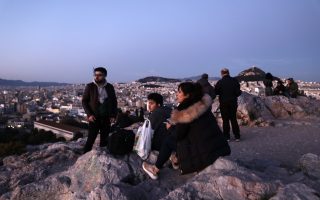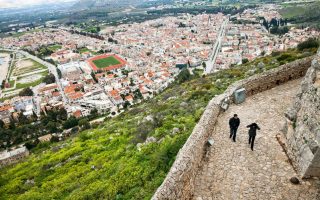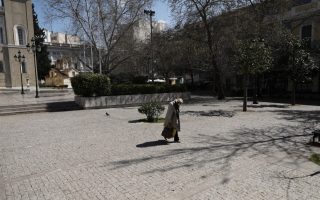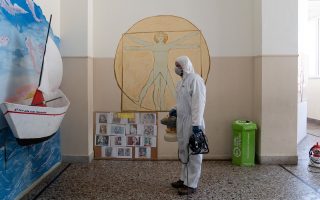Rites of Spring
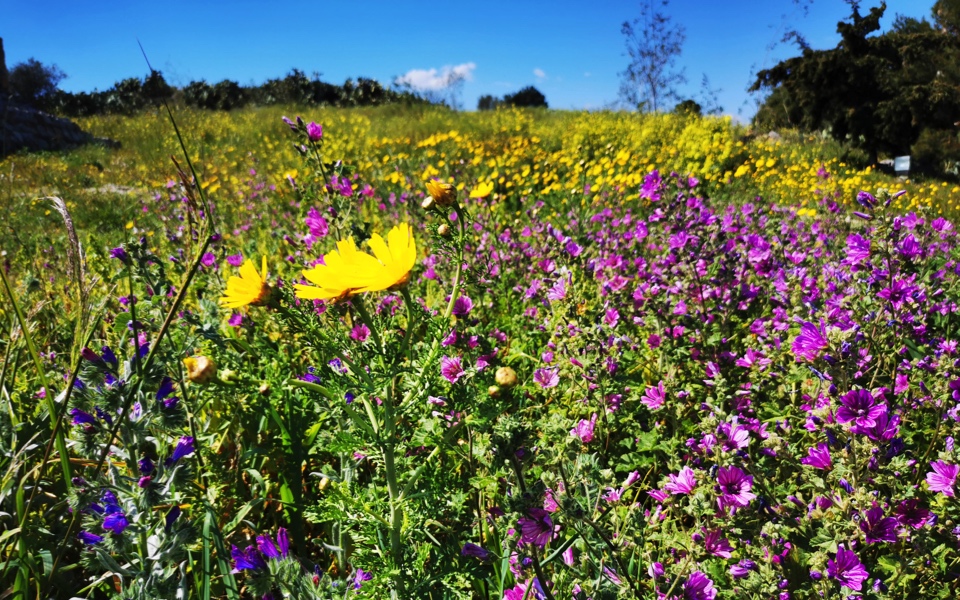
Shoots spring out of the mulberry tree’s dry branches, green settlements expanding on barren land. New tentacles reach out from the ivy, fresh leaves unfurl and grow. Everywhere – blossoms, shoots and buds. Life surges in its tracks, through every vein in plants and animals. It claims what it owns and keeps expanding, forcing the slightest crack, reaching for the light. In the city’s strange new silence, a songbird trills on a background beat of doves’ cooing. The neighborhood, the city, our civilization has frozen in midstep. In the silence, we hold our breath. We measure our lives in hours and days, in the number of the ill and the dead.
Nature’s awakening at the moment of our forced hibernation underlines how close to it we are and how cut off. Each is part of a whole, specks in an endless matrix of visible and invisible links. Even if we live in an apartment block, on our balconies we sweep away the season’s pollen, along with the Saharan sand and the droppings of birds. In the country, life’s rhythms are tuned to the struggle to join our efforts with nature’s production, so that we can eat. We keep sweeping leaves out of the yard, we know our place, we maintain our homes. When the last member of a family goes, when a house is shut down, the unpruned trees, the vines, the roots and ivy embrace it, pull it down, make it one with themselves, with the earth. Whether we fight alone to survive or to seek to build empires, we struggle on the surface of worlds that we do not determine, that we do not know.
The new coronavirus is the deadly reminder that though we may live with our minds in the stars, though we share our thoughts, our fantasies, our feelings with each other, we remain hostage to nature. Our flesh, our material self, is part of an unbreakable chain which ties us to every other living being. From the mulberry and fig trees in the yard (whose ancestors were brought here from southern Asia), to the person next to us, who might infect us with a virus that was born in the leap from wild animal to a human, our world is determined by forces completely indifferent to our fate.
Despite our learning, life never ceases to surprise us. Nor do we stop surprising ourselves: We are inventive and flexible, we want to live and will help each other achieve this. If this sounds ironic at a time when we are forced to turn our backs on our social selves, consider social networks, how they became such an important part of our lives and how we became a component of them. Facebook was founded in just 2004, Twitter in 2006. And yet these and even younger networks evolved into the most familiar piece of our collective experience. They help us withstand physical isolation, the familiarity they breed gives us a sense of security. But, like our physical bodies, these virtual homes have countless windows and doors through which the enemy might enter. It’s interesting to note that a basic feature of social networks is the ease with which things can “go viral.” The metaphor has made the leap into reality: We live with the fear of a real virus which spreads from body to body, as fast as a funny video or a malignant “virus” can infect our computer. We are vulnerable both in the real world, to which we belong, and in the virtual one, which we believe belongs to us (until we lose control over artificial intelligence).
Today we are in a war where the front is everywhere; the closer to home, the deadlier it is. As a society, with specialized people working for the common good, we have the skills to adapt, to survive. This adaptability, however, can bring danger. Aside from the economic and social disturbance that we already see, the mandatory deprivation of basic freedoms can lead either to some of these measures becoming permanent or to an excessive reaction when the danger seems to be over. The first danger is self-evident; the second involves how citizens see their responsibility toward society. Nature and ancient wisdom teach that moderation is best. Humans, though, cannot be restrained. We dive deep into ourselves in search of memories, emotions, ideas and fantasies, we push the limits of knowledge and imagination continually. That is how we got this far, for good or ill. That is what will save us.
It is spring. The trees wake, the birds sing. The pandemic danger demands international cooperation, social unity and personal responsibility. We are afraid, but we know that this crisis, too, shall pass. We will remain alive even in the harshest season.
